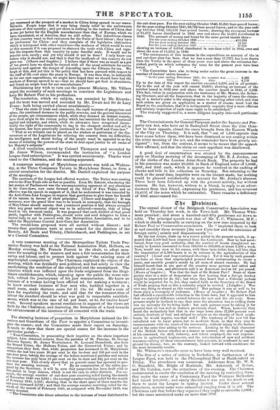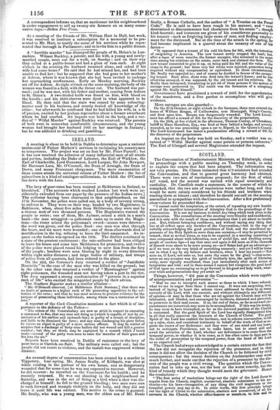be thobinces.
The annual dinner of the Bridguoth Conservative Association was held on Thursday last week, in the Town-hall. Mr. Thomas Whit- more presided ; and about a hundred-and-fifty gentlemen sat down to table. The principal speech was that of Mr. T. C. Whitmore, M.P.; which is chiefly noticeable as carrying on the new tone imparted by Sir Robert Peel to Conservative economists. He "implored them to look at and consider these measure [the new Corn-law and the admission Of foreign cattle] calmly and dispassionately "-
By the last return, made up to a recent period in the present month, it ap- peared that 2,500 had been imported from the Continent. Now he had ascer- tained, from very good authority, that the number of beasts slaughtered an- nually in London amounted to from 180,000 to 185,000, or about 3.500 a week. Now, would any man in his senses, with these facts before him, tell him that the importation of 2,500 beasts is to be ruinous to the agriculturists of this country ? (Loud and long-continued cheering.) Yet it was by such ground- less fears as these that unprincipled persons were endeavouring to create a panic, and unsettle people's minds by all sorts of absurd rumours. He had himself beard that in one part of the country some persona had salted and pickled an old cow, and afterwards sold it as American beef at 2c1. per pound. (Boars of laughter.) Was that the fault of Sir Robert Peel ? Some of these gentry were in a state of desperation on first hearing that a foreign donkey might be imported for 2s. 6d.; but when they heard that a Colonial jackass might be imported for ls. 3d., they rushed forth to the Secretary of the Board of Trade praying that so dire a calamity might be averted. (Laughter.) Was ever any thing so absurd as this conduct? But perhaps it was as well to let them enjoy a monopoly of jackasses. (Roars of laughter.) Sir Robert Peel had effected a considerable reduction in the Corn-laws, but it appeared to him that no material difference existed between the new and the old scale. Some persons might be inclined to say, that since the alteration was so trifling there was no necessity for its being made: but such persons must be taking it for granted that all was well as matters previously stood. When, however; they heard the melancholy fact that in one large town alone 17,000 persons were entirely destitute of food and obliged to subsist on the charity of their neigh- bours, he would inquire, was that well ? The tendency of the new bill was calculated not to lower prices, but to moderate them, so that they may be commensurate with the wants of the community, without injury to the farmer, and at the same time adding to the revenue. Looking to the high character of the British farmer whether as a master or servant, tbe amount of capital at his command, the skill, industry, and talent employed, the vast improve- ments in agricultural implements, and the introduction of new and artificial manures—taking all these circumstances into account, he confessed he saw no ground for dismay, but, on the contrary, looked forward with confidence for the most favourable results.
Mr. Whitmore's remarks seem to have been very well received.
The first of a series of soirees in Yorkshire, in furtherance of the League Fund, was held in the Philosophical Hall at Huddersfield on Friday. The attendance was numerous. Addresses from Mr. W. R. C. Stansfield, Mr. Bright of Rochdale, Mr. Ashworth of Bolton, and Mr. Cobden, were the attractions of the evening. The Chairman endeavoured to excite the emulation of the meeting by reminding them, that under the name of a Centennary Fund the Wesleyan Methodists had raised 200,0001.; and surely therefore it was not too much to ask them to assist the League in raising 50,000/. Under these several stimulants, several sums were subscribed ranging from 5L to W. The Chairman said that before they separated they ought to subscribe 1,0001. ; but the sums mentioned make no more than 370/.
A correspondent informs us, that an auctioneer int his neighbourhood is under engagement to sell up twenty-six farmers on as many conse- cutive days.—Bolton Free Press.
At a meeting of the friends of Mr. William Hutt in Hull, last week, it was resolved to institute a subscription for a memorial to be pre- sented to Mr. Hutt, to testify the sense of his services while he repre- sented that borough in Parliament ; and to invite him to a public dinner.
A " horrible murder" has dismayed the people of St. Helen's in Lan- cashire. Wilmot Buckley, a painter, and his wife, a young and newly- married couple, went out for a walk, on Sunday ; and on their way they called at a public-house and had a glass of rum each. At eight o'clock in the evening the husband returned alone, and asked if his wife had come home ? He said that he had missed her, and had been unable to find her ; but he supposed that she had gone to her mother's at Ashton, where it was known that she had been invited to undergo her approaching confinement. Early on Monday morning, Buckley set off for Ashton. At eight o'clock on the same morning, the body of the woman was found in a field, with the throat cut. The husband was pur- sued; and he was met, with his father and mother, coming from Ashton to St. Helen's. A two-bladed knife was found on him, with blood on the handle ; and his shirt-sleeves were dyed in what appeared to be blood. He then said that the stain was caused by some colouring- matter used in his business, and stoutly denied all knowledge of the crime : but afterwards he confessed that he had killed his wife, in a fit of passion, excited by her jealous reproaches about a former sweetheart whom he had courted. An inquest w as held on the body, and a ver- dict of " Wilful Murder" against Buckley was returned. The parents of both were in somewhat comfortable circumstances, and the young woman had brought her husband 100/. on her marriage in January ; but he was addicted to drinking and gambling.



























 Previous page
Previous page